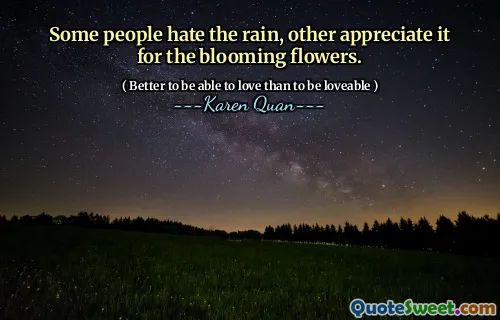"Better to be Able to Love than to be Loveable" emphasizes the importance of the ability to love over the desire for being loved. The book suggests that genuine love involves selflessness and the capacity to care for others, rather than merely seeking validation or affection from them. This paradigm shift encourages readers to focus on nurturing their inner selves and developing meaningful connections with those around them.
The author illustrates how loving others can lead to deeper, more fulfilling relationships. By prioritizing love and compassion, individuals can create environments where trust and respect flourish. This approach ultimately cultivates a more impactful and enriching life experience, as opposed to fixating on external approval and affection.
Additionally, the book discusses the potential challenges that arise from loving selflessly, such as vulnerability and the risk of rejection. However, it ultimately argues that these risks are outweighed by the rewards of authentic connections and personal growth. By embracing the ability to love wholeheartedly, one can achieve a sense of purpose and happiness that transcends the need for external love or validation.
More »
Today Birthdays
1955 -
Max Lucado
1946 -
John Piper
1842 -
William James
1907 -
Abraham Joshua Heschel
1887 -
Aldo Leopold
1755 -
Alexander Hamilton
1976 -
Alethea Kontis
1971 -
Mary J. Blige
1825 -
Bayard Taylor
1943 -
Jim Hightower
1885 -
Alice Paul
1923 -
Carroll Shelby
1928 -
David L. Wolper
1954 -
Kailash Satyarthi
1972 -
Amanda Peet
1946 -
Naomi Judd
1970 -
Malcolm D. Lee
1955 -
Christian Marclay
1973 -
Rahul Dravid
1987 -
Jamie Vardy
1942 -
Clarence Clemons
1992 -
Fatima Sana Shaikh
1948 -
Larry Harvey
1930 -
Rod Taylor



